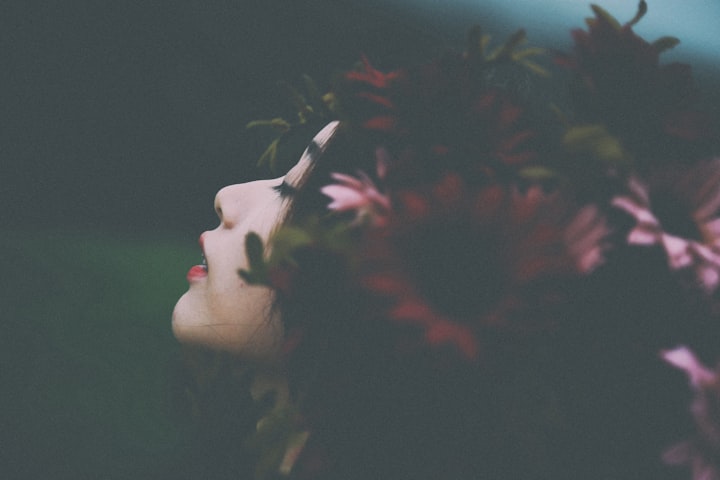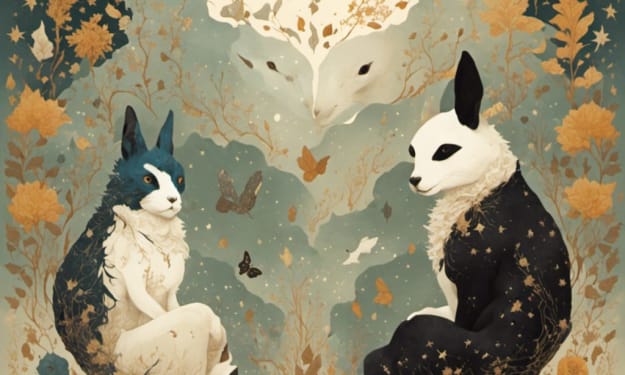The Hearthkeeper
A city dwelling fae remembers her magical roots.
When the howling wind rattles my little apartment window, I know it’s calling me. We fae were never meant to live in cities, my mother always said. We are forest creatures. The life in our bones is the same as that of the stones beneath the hills. Our breath is the wind, our blood is the river.
That may be all well and good for the ancient fae, but today society belongs to the folk. Those without magic, those born human. Those who make laws for all of us, who keep the conversation from straying too far from their own stories.
Besides, it’s impossible to get a job in the forest. For a fae, there’s only a handful of choices. Live in the fae territories in the woods, where one meeting circle means the village is rich, or move to the folk-dense cities and take up work as a Hearthkeeper.
I always knew I’d end up in London. I just didn’t realize how cold it got here, how the skies are never dark, yet I still never see the stars. I knew the stories of fae who had left the forest, only to return with mouths drawn low. I also knew the stories of the fae who left and never returned at all. In the village, we didn’t know what was worse.
Life as a Hearthkeeper for a rich folk family wasn’t so terrible. I could afford my own apartment, could buy my own clothes and food. I spent my days over a cauldron in my folk family’s home, cooking and baking, or else scrubbing floors and tidying using my magic. Hearth magic is simple. Gentle, clear, safe to the folk. It’s when we use complicated spells, when we start experimenting. That’s when the folk get nervous. But the godmother look that hearthkeepers wear makes folk feel at ease. Gentle, soft spoken, pastel clad fairies with white hair and wrinkled brows are harmless. Especially when we make soup and homemade bread that tastes better than anything any folk could ever create. Our spotless, efficient cleaning skills, our every present smile and soft, pudgy skin makes folk think of fairytales, of innocent goodness that totally erases our power, our history, our ways.
Part of me despises the whole charade. Another part loves the buildings and the noise and the brightness of the city too much. If it were easier, if it were kinder, if it were more like a fairytale, fae might have more opportunities in the folk world.
As it was, my hearth magic had begun to fail me. For whatever reason, I had started having trouble at work with the simplest of spells. Just today, I had undercooked the folks’ dinner, and my magic hadn’t washed the windows even though I set it to, and had ended up going back and scrubbing each one by hand.
I was too tired to think about it anymore. I rested my forehead against the window of the tube car. I was still in my hearthkeeper clothes- pink and purple and yellow and orange tea length skirts, oversized pockets with a painted daisy on each. A shimmery pink spidersilk blouse and shawl, and a wand through my half up bird’s nest hair. I was sure to make sure my pointed ears were still covered, for it made folk uncomfortable to see fae ears. The wand was just for show, as it was not as if the fae actually used wands. So many folk loved the notion that we did. As if our power came from a stick, rather than ourselves.
Across from me sat another hearthkeeper, looking totally spent, knitting a scarf with two silver wands and staring out the window at the lights in the dark wheezing past. The tube came to a stop. A few people shuffled out, toting bags or boxes or children.
And then, a fae stepped on. But she was not dressed like a Hearthkeeper. She wore traditional fae clothing. The long green and brown skirts that looked like the texture of bark or pinecones, hair unbound save for her braided crown, a blouse that looked to be stitched of ivy leaves with a brooch made from pearls. She had ear piercings that ran the length of her pointed ears, her hair tucked behind them. Her soft bark slippers with tiny gemstones sewn on the top of the toe. She did not have an ounce of plastic glitter, fake flowers, pastels, tulle, or shimmery pink lip gloss.
I stared, and I was not the only one. The hearthkeeper across from me let her knitting slid to the floor, her mouth open staring at the newly arrived fae.
She didn’t seem to notice, or perhaps it was rather that she didn’t seem to care if people stared at her. We were almost alone in the compartment now, anyway, for her appearance had frightened most of the folk out of the tube car with a scowl, a sneer, or an eyeroll.
It wasn’t until a few minutes later that I realized I had been staring still, for she locked eyes with me in the reflection of the darkened window.
“Hearthkeepers?” She asked us. The knitting fae snapped her attention back to her needles, and pretended not to hear. I pressed my lips together, and rose from my seat, crossing the aisle to sit with the strange fae.
“I am.” I said, sitting opposite her. “I’m sorry if I was staring, I’ve just… I’ve never seen traditional fae dress in the city before.”
The girl shrugged. “You can’t have been here too long, then.” She smiled. “I’m Honora Toadflax.”
“Acantha Shadfly.” I said. “And, you’re right. I’ve only been here a few months.”
Honora nodded. “How are you enjoying work so far?”
I made a vague motion with my hand. “It’s alright. I miss home sometimes, but the family I work for is kind enough.”
Honora dug into her pocket. “It took me ages to make friends here.” She pulled out her phone, handing it to me. “Add your number in. There’s a feast this Saturday, at a friend of mine’s place. She has access to a rooftop garden.”
“Ohh, Really? That’s the full moon! So they’ll be a-”
“Yeah, there’s gonna be a fairy circle. You have to come, it’ll be awesome.”
Smiling widely, I took the phone from her and added my number. “It sounds incredible!”
I felt the other hearthkeeper watching me. I glanced over. Her eyes were fixed on us, her hands moving rapidly over her knitting. I looked away, bit my lip.
“I’ll try to come, though sometimes my folks need me to work over the weekend, as well.”
Honora nodded slowly, tilting her head to the side.
“Well, I’d love to see you there. We’re expecting a great turnout. It’ll be like being back in the forest again.”
I dare not think on the swell of sunshine that bloomed in my chest. “This is my stop. Thanks again, Honora. I’ll see you around.”
The walk to my apartment from the tube station was quick. I didn’t like to dilly dally when the sun was setting, still dressed in my hearthkeeper clothes. Up the four flights of narrow victorian stairs, and down the dim hall.
My phone buzzed. Honora’s text, sending me the address. I sent back something about hoping I can make it. I pocketed my phone and then pulled out my keys.
Inside my apartment was chilly. I closed the door, then muttered the protection spell and traced the lines of the doorway in the air with my finger. I then went to the fireplace and got the fire lit, and pulled shut the curtains. I waved my hand at the little fridge, which opened. Out bobbed a few carrots, a radish, mushrooms, an onion, beets, vegetable broth, and celery. A drawer opened, and a cutting board floated onto the counter, met by a sharp knife from the block. As the vegetables went about being chopped, I waved the broth over and grabbed hold of it, pouring it into the cauldron on its hook over the fire. How lucky fae were in London, I thought. In some cities, not all tiny apartments would be equipped with a working fireplace. How nice it was, then, that at least the ancient rituals involving cauldrons and fire were available to me, and I did not have to resort to brewing a cauldron of halfmoon tea or honouring beltane fires over a microwave or a george foreman grill.
The sounds of chopping stopped, so I waved my hand again and the vegetables made a gentle arc, going straight into the cauldron. I pulled the wooden spoon from the hook beside the fire and gave the contents a stir.
I sat down in the plushie armchair and held my hand out, and 1,001 Charms to Scrub a Pot, and Other Hearth Spells soaring into my palm. I picked up where I left off last night, the chapter on coffee stains. Any Hearthkeeper worth her salt knows one of the best charms for getting a smudge out of silver is the same as getting a grass stain our of brocade! Folk material is often factory made, and this industrial touch creates simple paths for fae magic to follow. It is not so important to know the source of the stain, as it is the source of the material!
I shifted in my chair.
Folk material is often factory made, and this industrial touch-
No, I had already read that line. I skipped down a bit.
It is not so important to know the source of the stain, as it is-
I cast the book aside. My Hearthkeeper agency had told me to read the book at least twice through. But it had been weeks and I could not get past the third chapter. I sat in my chair, watching my soup begin to bubble.
My eyes trailed off to the little secretary’s desk in the corner. I rose from the chair and went to it, opening the desk. There, a dark green bound grimoire with delicate artwork of the tree, encircled by a fairy ring of mushrooms. I drew it out and into my hands, feeling the strange pull of green leaves and reaching branches, of golden sunshine and soft moonlight.
I opened the spellbook, looking over the charms and enchantments from my mother, and her mother before her, and hers before that. Spells not just for cooking and cleaning, but for real, true magic. Incantations to make things happen, to change and transform.
I felt the magic in my hands, and my mind filled with the rush of beauty and power that comes with casting real spells. I sighed and reached into my pocket, taking out my phone. Hey Honora. Count me in for the feast.
***
“Acantha. I told you,” Mrs. Oliver said. “I want the floors washed and you still need to finish polishing the silver, particularly the teapot, before you leave for the night.”
I paused, my shawl half onto my shoulders. “Oh, certainly, Mrs. Oliver. I’m sorry, I’ll get right to it.”
She pursed her lips. “Acantha, If the silver is not polished, it might as well be a warty toad sitting on my tea tray. That’s how much use a dirty teapot is to me. That is how much use faulty hearth magic is to me.” She gave me a long look. “Do you understand?” She was already frustrated because I had taken so long to make dinner. But that was only because I was having trouble making the bread cook evenly with magic, and had had to start over again when I had accidentally magically turned the heat in the oven up and burned the first loaf. Mrs. Oliver sniffed and swept out of the grand room. I grit my teeth. Saturday evening, and she wants me to stay late to polish the silver. Since meeting Honora on the tube, I had finally begun to realize just how ridiculous Hearthkeeping is. Ages and ages ago, Hearthkeepers used to tend fires for folk families. They would cast a spell to keep a roaring fire for the families once a day. But gradually, little odd jobs were added, until eventually Hearthkeeping evolved into a magical maid service. Sometimes I wished that it had stayed as simply firemending.
I went back into the kitchen storeroom and began taking the silver out of the closet again with a flick of my hand. With the other, one wave of my hand got the mop and bucket out, but of course the bucket would not fill, and then the mop would not go where I bid it. Annoyed now, I grabbed the mop and did the job by hand. While I worked, a few of the silver pieces polished themselves, but I ended up having to polish a number of them by hand. As quick as I could, I finished the jobs, though not very neatly. I rushed out before Mrs. Oliver could see me, and made my way downtown toward the feast.
I tried not to think about my failing magic as I made my way down to the tube. In my bag, I had my traditional fae dress. The train of my skirts trailing into leaves, the fabric the colour of the emerald forest canopy. The bodice was stitched in with tiny emeralds.
I got off the tube and made my way to the apartment building, stopping in the lobby bathroom to change and braid my crown atop my head. I swallowed before leaving, swinging my bag over my shoulder with my Hearthkeeper’s clothing tucked deep down within.
The elevator was empty, its music sounding strange. The doors finally opened, and I walked down the hall to the stairs. One last floor.
I wasn’t expecting it to feel so very much like the forest. Magic, surely, had been used to create such an effect. The trees that appeared to grow on the top of the apartment building seemed ancient. Oaks, pine, spruce, elder, ash, birch and maple grew wide and tall. I breathed in the deep rich scent of the forest, and tears sprang from my eyes. The smell of home.
“Acantha!” Honora’s voice came from behind a thicket. I followed it into a clearing. Right away, it felt as if something had taken hold of my heart. A circle of toadstools lay in the clearing, with little tables and chairs surrounding it, laden with sweets and wine and candied pears. Fae in proper fae clothing stood or danced or sat in the clearing, a whole symphony of laughter like little bells ringing through the forest. The smells of baking, of the woods and flowers and elderwine tingled in my nose. I felt something rise within me, something strong, something as golden as the sun and swift as the current. I felt my powers flood in like a storm.
This feels like home.
“Acantha, I’m so glad you could make it.” Honora said, coming up beside me. “I was worried you had changed your mind.”
She offered me a glass of elderwine, which I took with a gracious nod.
“Thank you. I’m sorry, I got caught up at work.” I dropped my voice, not sure how hearthkeepers would be looked upon by this goup, and whispered just to Honora, “My hearth magic has just been less than reliable lately…. Anyway, I’m here now.”
“That happens quite often, you know.” Honora said in her normal voice. “It tends to happen to the most powerful of fae.”
I took a sip of my wine. “Really? Why would that be?”
“Our magic is wild, Acantha. It was never meant to be domesticated to do folks’ bidding. Our magic is noble, and bright, as powerful as the wind.”
I smiled. “I feel that, here. It’s like waking up after a long night of not dreaming.”
Honora nodded. “It’s being in the woods again. Surrounded by fae. We feed eachother’s magic. Help eachother grow stronger just by being near. Isn’t that incredible? Folk don’t want us to find eachother. They don’t want us to be powerful. Don’t you see that, Acantha? Why do you think they bind us into work that lessens our powers? That isolates us and tires us so?”
“I know.” I said, taking another sip of wine. “I know. I see it. But what else can we do? What else do I have?”
Honora smiled. “You have us. Our sisterhood. Here, under the full moon, we have a whole coven of sisters. And if we keep together, if we help each other, we can make our power grow. We can change things. We are only dangerous when we’re pushed down. We have the power of mother nature in our blood. We are meant for so much more than the places they put us.”
I nodded, draining my glass. Just then, the moon, a full silver orb, crossed into the clearing, casting its light over the ground.
All the fae knew what to do, even without saying a word. The dance was as ancient as the stones far below the surface, as old as the stars in the sky.
The fae twirled and dipped, spun and bowed. As the moon cast its shadow further across the clearing, and the night sky turned slowly to the warm dawn, the fae danced their circle. I lost myself in the ancient ways, feeling with each step more and more myself. When the golden sun finally crested, the fae collected up their bags and left the strange forest clearing on the rooftop.
I had almost forgotten the strange feel of concrete under foot as I made my way home. I did not bother to change back into my hearth keeper’s clothes. I wanted to wear my real clothes, my fae clothing. I wanted to keep close the strange magic that had made me feel so alive once more, that had, I was sure, brought back my magic in full force.
I went to the folk family I had been working for. I wasn’t supposed to be at work for another few hours, to make them breakfast, I went right into the house. I picked up the terribly polished silver teapot, casting a spell I hadn’t cast in months. A spell of transformation.
I laid out Mrs. Oliver’s tea tray, warty toad ribbiting happily next to the sugar bowl.
I did not wait to see Mrs. Oliver’s reaction. I had wasted enough time on folk. And besides, there was so much ancient magic to practice, and the golden sun was already rising in the sky.







Comments
There are no comments for this story
Be the first to respond and start the conversation.